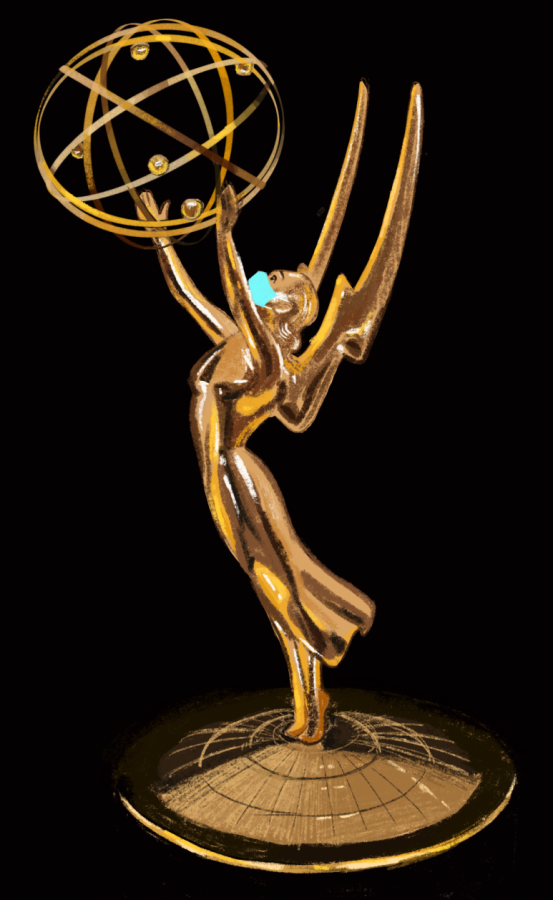The 2020 Emmys projected levity without masking reality
The primetime Emmys, held to recognize outstanding work in American primetime entertainment programming, was the first major awards ceremony to occur during this new normal.
September 25, 2020
Interns in hazmat suits, cardboard cut-outs of celebrities and an empty Staples Center. Last week’s Emmy Awards were anything but a vivid depiction of how the coronavirus pandemic has infiltrated every corner of our known world, even seemingly glamorous Hollywood.
The primetime Emmys, held to recognize outstanding work in American primetime entertainment programming, was the first major awards ceremony to occur during this new normal. Complete with attendees tuning in via videoconferencing and an ample use of laugh tracks, the Emmys displayed a superficial continuation of the norm, something that television has always excelled at.
Having an evening dedicated to the champagne problems of Hollywood’s biggest A-listers seems out-of-touch and frankly unnecessary in the broader context of the pandemic, a nationwide racial reckoning and the imminently approaching presidential election. Host Jimmy Kimmel and the Television Academy were well-aware of this jarring contrast and made conscious efforts to infuse essential bits of reality.
Everyday Americans, from a rancher to a New York City nurse, presented awards while sharing their stories about how they’ve been keeping up amidst COVID-19. Winners accepted awards and gave speeches from the comfort of their living rooms in clothing that you and I would wear. And Kimmel used hand sanitizer from an Emmy statue that had been converted into a dispenser.
This first foyer into the 2020-21 Hollywood awards season signified a breath of frivolity in what has been an incredibly grim year. The perils of an incongruous government and systemic racism took a front seat during the ceremony as reflected in both acceptance speeches and winning shows.
Starring Regina King and Yahyah Abdul-Mateen II, Limited television series “Watchmen” received 26 nominations and took home 11 in total. Based on the 1986 DC Comics series of the same name, “Watchmen” details the continuing perils of white supremacy and racial injustice almost a century after the 1921 Tulsa race riots, a chapter of American history rarely mentioned despite being one of the worst racial injustices in the nation’s past.
In the series, an alt-right group wages widespread attacks on minorities and the police department, which has implemented reparations for victims of racism; it made headlines when it first dropped on HBO last fall and made a resonant reappearance in the aftermath of George Floyd’s killing this past summer.
“The fires that destroyed Black Wall Street still burn today,” said screenwriter Damon Lindelof in his acceptance speech when the show won Outstanding Limited Series. “The only way to put them out is if we all fight them together.”
The Alliance for Inclusive and Multicultural Marketing aired an advertisement during the show, calling on Hollywood to be more inclusive, a problem that the entertainment industry has been battling with for years with no substantial change. Prominent celebrities like Puerto Rican-American composer and actor Lin-Manuel Miranda and Korean-American actor Daniel Dae Kim were featured in the ad, the latter of which left the show “Hawaii Five-O” in 2017 after reports emerged that he would be paid less than his white co-stars.
Another reminder of the gradual progressive fight against colorism in Hollywood, Zendaya, who identifies as Black, made history as the youngest winner for Outstanding Lead Actress in a Drama Series for her work in “Euphoria” as Rue Bennett, a recovering drug addict. In her acceptance speech she said, “I know this feels like a really weird time to be celebrating, but i just want to say there is hope in the young people out there.”
It was indeed a strange time to be celebrating. More than others, perhaps this year the recurring question of the need for award shows was relevant. Regardless of their frivolous nature, these shows, whether it be the Emmys or the Oscars or the Grammys, encourage artists to keep doing what they’re doing. Humanity’s dependence on the arts has become apparent in the last six months, and this industry has proved through a feeling of camaraderie and appreciation that better times are closer than they may appear.
Lindelof ended his speech with a piece of advice to fellow artists: “Stop worrying about getting canceled, and start worrying about what you’re doing to get renewed.”
His words echo louder than ever this year and are a reminder to us all to focus on creating solutions and enacting change for tomorrow, rather than getting distracted by the mistakes of yesterday. That’s what 2020 has taught us.




![LALC Vice President of External Affairs Raeanne Li (11) explains the International Phonetic Alphabet to attendees. "We decided to have more fun topics this year instead of just talking about the same things every year so our older members can also [enjoy],” Raeanne said.](https://harkeraquila.com/wp-content/uploads/2025/10/DSC_4627-1200x795.jpg)


















![“[Building nerf blasters] became this outlet of creativity for me that hasn't been matched by anything else. The process [of] making a build complete to your desire is such a painstakingly difficult process, but I've had to learn from [the skills needed from] soldering to proper painting. There's so many different options for everything, if you think about it, it exists. The best part is [that] if it doesn't exist, you can build it yourself," Ishaan Parate said.](https://harkeraquila.com/wp-content/uploads/2022/08/DSC_8149-900x604.jpg)




![“When I came into high school, I was ready to be a follower. But DECA was a game changer for me. It helped me overcome my fear of public speaking, and it's played such a major role in who I've become today. To be able to successfully lead a chapter of 150 students, an officer team and be one of the upperclassmen I once really admired is something I'm [really] proud of,” Anvitha Tummala ('21) said.](https://harkeraquila.com/wp-content/uploads/2021/07/Screen-Shot-2021-07-25-at-9.50.05-AM-900x594.png)







![“I think getting up in the morning and having a sense of purpose [is exciting]. I think without a certain amount of drive, life is kind of obsolete and mundane, and I think having that every single day is what makes each day unique and kind of makes life exciting,” Neymika Jain (12) said.](https://harkeraquila.com/wp-content/uploads/2017/06/Screen-Shot-2017-06-03-at-4.54.16-PM.png)








![“My slogan is ‘slow feet, don’t eat, and I’m hungry.’ You need to run fast to get where you are–you aren't going to get those championships if you aren't fast,” Angel Cervantes (12) said. “I want to do well in school on my tests and in track and win championships for my team. I live by that, [and] I can do that anywhere: in the classroom or on the field.”](https://harkeraquila.com/wp-content/uploads/2018/06/DSC5146-900x601.jpg)
![“[Volleyball has] taught me how to fall correctly, and another thing it taught is that you don’t have to be the best at something to be good at it. If you just hit the ball in a smart way, then it still scores points and you’re good at it. You could be a background player and still make a much bigger impact on the team than you would think,” Anya Gert (’20) said.](https://harkeraquila.com/wp-content/uploads/2020/06/AnnaGert_JinTuan_HoHPhotoEdited-600x900.jpeg)

![“I'm not nearly there yet, but [my confidence has] definitely been getting better since I was pretty shy and timid coming into Harker my freshman year. I know that there's a lot of people that are really confident in what they do, and I really admire them. Everyone's so driven and that has really pushed me to kind of try to find my own place in high school and be more confident,” Alyssa Huang (’20) said.](https://harkeraquila.com/wp-content/uploads/2020/06/AlyssaHuang_EmilyChen_HoHPhoto-900x749.jpeg)









